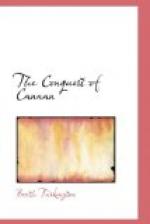It needed nothing to finish Joe with the good people of Canaan; had it needed anything, the trial of Happy Fear would have overspilled the necessity. An item of the testimony was that Joseph Louden had helped to carry one of the ladies present—a Miss Le Roy, who had fainted— to the open air, and had jostled the stranger in passing. After this, the oldest woman in Canaan would not have dared to speak to Joe on the street (even if she wanted to), unless she happened to be very poor or very wicked. The Tocsin printed an adequate account (for there was “a large public interest"), recording in conclusion that Mr. Louden paid the culprit’s fine which was the largest in the power of the presiding judge in his mercy to bestow. Editorially, the Tocsin leaned to the facetious: “Mr. Louden has but recently `returned to our midst.’ We fervently hope that the distinguished Happy Fear will appreciate his patron’s superb generosity. We say `his patron,’ but perhaps we err in this. Were it not better to figure Mr. Louden as the lady in distress, Mr. Fear as the champion in the lists? In the present case, however, contrary to the rules of romance, the champion falls in duress and passes to the dungeon. We merely suggest, en passant, that some of our best citizens might deem it a wonderful and beauteous thing if, in addition to paying the fine, Mr. Louden could serve for the loyal Happy his six months in the Bastile!”
“En passant,” if nothing else, would have revealed to Joe, in this imitation of a better trick, the hand of Eugene. And, little doubt, he would have agreed with Squire Buckalew in the Squire’s answer to the easily expected comment of Mr. Arp.
“Sometimes,” said Eskew, “I think that ’Gene Bantry is jest a leetle bit spiderier than he is lazy. That’s the first thing he’s written in the Tocsin this month—one of the boys over there told me. He wrote it out of spite against Joe; but he’d ought to of done better. If his spite hadn’t run away with what mind he’s got, he’d of said that both Joe Louden and that tramp Fear ought to of had ten years!”
“’Gene Bantry didn’t write that out of spite,” answered Buckalew. “He only thought he saw a chance to be kind of funny and please Judge Pike. The Judge has always thought Joe was a no-account—”




